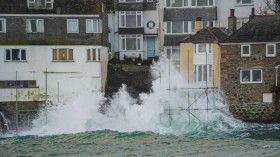As climate change warms our world, glaciers in Iceland are melting and causing the land to literally rise up in response, according to a new study.
Geologists have long known that as glaciers melt and become lighter, Earth rebounds as the weight of the ice decreases. Whether or not that is the result of past or present deglaciation, however, has been up for debate - that is, until now.
"Iceland is the first place we can say accelerated uplift means accelerated ice mass loss," co-author Richard Bennett, from the University of Arizona, said in a statement.
Due to accelerated warming that began about 30 years ago, Earth's crust under Iceland is rebounding from ice melt so much that some sites are moving upward as much as 1.4 inches per year - faster than researchers expected.
"What we're observing is a climatically induced change in Earth's surface," Bennett said.
To figure out how fast the crust was moving upward, the team used a network of 62 global positioning satellite receivers fastened to rocks throughout Iceland. By tracking the position of the GPS receivers year after year, the scientists essentially saw the rocks rise up and then calculated how far they traveled - a technique called geodesy.
Unsurprisingly, areas that exhibited the fastest uplift were those located between several large ice caps, whereas the rate of uplift slowed the farther the receiver was from the ice cap region.
What's more, the kind of dramatic uplift this study demonstrates isn't the result of the same rate of ice loss year after year, researchers say. The glaciers had to be melting faster and faster to be causing more and more uplift.
"There's no way to explain that accelerated uplift unless the glacier is disappearing at an accelerated rate," Bennett explained.
The team hopes their findings, published in the journal Geophysical Research Letters, can lead to more accurate measurements of modern ice loss and thus help better determine what climate change has in store for the Earth's future.
For more great nature science stories and general news, please visit our sister site, Headlines and Global News (HNGN).
© 2024 NatureWorldNews.com All rights reserved. Do not reproduce without permission.
![Severe Thunderstorm Alert: Tornadoes, Damaging Winds and Hail Possible from Upper Ohio Valley to Northeast US [NWS]](https://1471793142.rsc.cdn77.org/data/thumbs/full/70161/280/157/50/40/severe-thunderstorm-alert-tornadoes-damaging-winds-and-hail-possible-from-upper-ohio-valley-to-northeast-us-nws.jpg)




